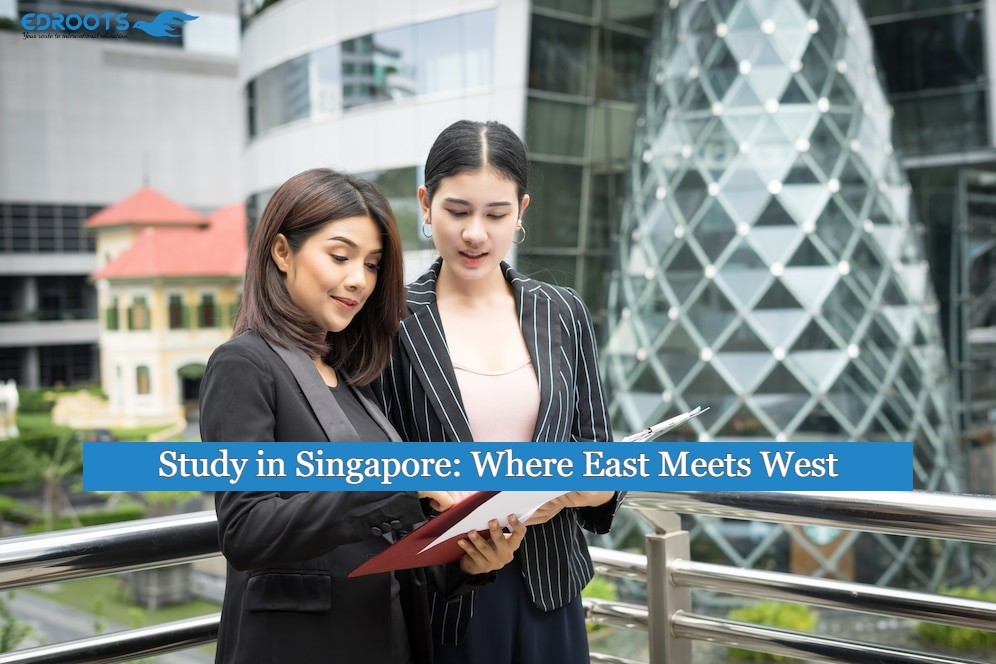Singapore is a global business hub and undoubtedly Asia’s education hub. The country’s exposure to a dynamic and diverse economy and strategic location in Asia makes it an ideal place for students interested in business, finance, and international trade. Singapore’s passport tops the Henley Passport Index 2024 as the world’s strongest, offering visa-free access to 195 countries. Moreover, the 'Asian Tiger' is known for its cultural and racial diversity, where English is the primary language of instruction in Singapore's universities, making it an attractive destination for international students, even though the city-state has four official languages, i.e., Malay, Mandarin, Tamil, and of course, English.
The country has been recognised among the safest cities in the world. The country follows firm rules and maintains a zero-tolerance policy towards any sort of violence, physical or mental. Overseas students feel absolutely safe both on and off campus. The country has pulled in expatriates from different regions of the globe, holding distinct nationalities and practising different religions. Major ethnic groups peacefully coexist with the rest of the groups, creating a harmonious atmosphere for living. Singapore’s public transportation system is perceived to be among the best in the world due to its affordable prices, feasibility, and frequent availability.
Why Singapore?
Each year, around 80,000 to 85,000 students from across the world, representing more than a hundred nationalities, opt to study in Singapore. The country is home to several prestigious institutes which also include the National University of Singapore (NUS) and Nanyang Technological University, Singapore (NTU), ranking among the world’s top 20 universities in the QS World University Rankings 2024. Moreover, the students can choose top private institutions like DIMENSIONS International College or the campuses of prominent Australian universities like James Cook University and Curtin University.
You can also read: Study at Top Western University Campuses in Malaysia at Affordable Rate
Singapore is ranked fifth in the Global Innovation Index and invests heavily in research and development, fostering a culture of innovation and entrepreneurship. Students have access to cutting-edge facilities and are encouraged to engage in research projects that address real-world challenges. The country is known for its strict cleanliness rules, making it an ideal place for students to live and study, combined with excellent healthcare, public transportation, and recreational facilities. The city’s vibrant arts and cultural scene and numerous parks and green spaces provide a well-rounded living experience.
Highlights of Singapore as a Destination of Study
- Asia's education hub, attracting students from around the world
- Multilingual where English is one of the official languages
- Option for a post-study work visa
- Major financial and business hub in Asia and the world
- One of the best in the world for public safety and cleanliness
- Home to several top-ranking universities offering diverse courses
- Known for its cultural diversity, with Chinese, Malay, and Indian influences
- Opportunities for internships and networking with top-rated MNCs
- Strong emphasis on technological innovation and research
- High quality of life with excellent healthcare system
- Cutting-edge facilities and social infrastructure
Average cost of studying in Singapore*
UG – 25,000 – 40,000 SGD per annum
PG – 25,000 – 46,000 SGD per annum
Average cost of living in Singapore*
1500 -2000 SGD per month
Average income in Singapore*
2000-3000 SGD per month (after course completion)
*Subject to change depending on latest revisions, universities, and locations
Popular Courses to Study in Singapore
- Computer Science and IT
- Hospitality and Tourism Management
- Business management
- Finance and Public Policy
- International Relations and Global Affairs
Entry requirements in Singaporean institutions
- Academic records and transcripts
- Entrance test qualification, if required
- Language proficiency test scores, if applicable
- Mandatory identity documents
- Other exam scores, if any
- Letters of Recommendation
- Statement of Purpose
- Portfolio, if applicable
- CV / Resume, if applicable
- Work experience, if applicable
These requirements vary depending on the academic level of the course and the university. Major intakes happen in September and January, with some universities providing May intake as well.
You can also read: Self-Application or Study Abroad Consultant: Which is Better?
Student Visa Requirements for Singapore
- A letter of acceptance from a recognised educational institution in Singapore
- A valid passport
- Payment of the student visa application fee
- Academic transcripts and certificates
- Evidence of sufficient funds to cover living expenses/filled-in Declaration Form
- Recent passport-sized photos
A student may be asked to produce additional documents as applicable.
Economic and Job Prospects
Singapore's robust economy and low unemployment rate provide a favorable environment for graduates seeking employment. The city is home to numerous multinational corporations and startups, offering diverse job opportunities. Although the island nation occupies a tiny space on the world map, the job opportunities it offers to foreign nationalities are plenty. Considered a hub of global economic activity, the country roughly has over 25,000 international organisations.
Students studying in universities/colleges can easily get a part-time job with a good company and earn something to manage their additional expenses, including paid internships. Situated at the crossroads of Asia, Singapore offers easy access to major markets in the region. Its strategic location makes it a hub for international business and trade, providing ample opportunities for internships, networking, and career advancement.
Scholarships to Study in Singapore
There are various scholarships, grants, and financial aid options available for international students, making education in Singapore more accessible. Many institutions also offer work-study programs to help students manage their finances while gaining valuable work experience. Financial aids such as scholarships, grants, and bursaries ease the financial burden of those students who have attained good scores, qualifying them to study abroad, but cannot do so due to their financial constraints like Lee Kong Chian Graduate Scholarships.
Education Loan for Studying in Singapore
Students planning to obtain an education loan should be familiar with the guidelines for the same and qualify them in order to apply to their choice of money lending institution/bank. The Education Loan eligibility criteria vary for different banks. The loan application guidelines listed below apply to majority of the nationalised banks:
- Indian students who have obtained a place in selected educational institutions for higher education in Singapore can apply for education loans.
- Students can apply for a minimum loan amount of SGD 20,000 and the maximum is up to 100% of the student’s (borrower) tuition fees.
- The Moratorium Period is 6 months before students have to begin repaying the loan amount. They under no circumstance have to repay the amount during the course’s tenure.
- Students have a minimum of 1 year and a maximum of five years to repay the loan once the Moratorium Period ends. However the loan term should not exceed 10 years under any circumstances.
- For every bank, the student/education loan interest rate is different.
Part-Time Work Options for International Students in Singapore
Singapore does not permit students to pick up any work. Singapore universities offer internships related to the courses that students plan to pursue. A student can only opt for these related internships. Also, most of the universities have partnered with industrial houses which would provide the students with a part-time working opportunity. The Ministry of Manpower, Singapore, considers overseas students on a Student Pass eligible for working part-time for around 16 hours every week during term and for unlimited hours during vacations. Please keep in mind that students studying in a university/ institution not on the list of approved institutions cannot work part-time or full-time both during the term and/ or vacation.
Post-Study Work Permit in Singapore
Students are not allowed to stay in Singapore on their Student Pass or Study Visa to search for employment like in other European nations or the USA. This does not necessarily imply that they need to return to India once they’ve completed their studies. They have an option of staying back for one to three months. Most of the time when a graduate student’s student pass has expired or has been canceled, a short-term visit pass is granted to him/her. This permits them to stay in Singapore for 90 days maximum during which they can search for different job opportunities which exist. But being on this visa one cannot take up any employment, only find job options
Permanent Residence
Foreigners who wish to become permanent residents of Singapore can do so by getting an Entry Permit. One may qualify to apply for Permanent Residence Permit if one is:
- Aged parent of a citizen of Singapore
- Spouse of a citizen of Singapore/Permanent Resident (SPR)
- Unmarried kids, aged 21 and below, of a citizen of Singapore or PR
- Studying in Singapore as a student
- Investors from an overseas land
- Possessing employment or S pass.
So, a degree from a reputable Singaporean institution is recognized and respected worldwide, enhancing graduates' employability and career prospects. Overall, Singapore’s blend of academic excellence, cultural diversity, safety, and quality of life makes it an attractive destination for international students.
Get in touch with the certified career advisors at Edroots International to learn more and check your eligibility for admission to different programmes and institutions in Singapore by reaching out to us at +91 9349 555 333.





Enquiry Form